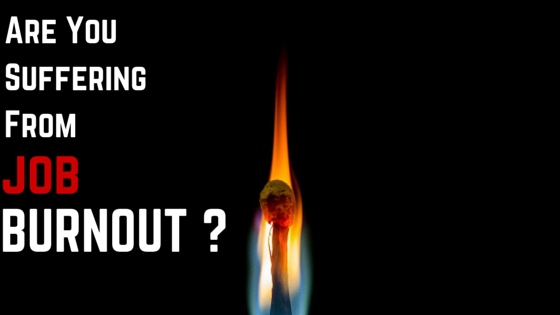Exhaustion, a decline of interest in work projects, and a serious decrease in job performance are all signs of workplace burnout – an increasingly common result of chronic stress. Burnout is most common in human services professions – doctors, police officers, teachers, customer service reps and social workers – as it often stems from a lack of emotional resources to handle the strain of your current work environment and interpersonal interactions. The exhaustion can be mental, emotional and physical.
3 Types Of Burnout
- Exhaustion
- You feel completely overwhelmed with the amount of work you have, so you increase your work hours despite finding it harder to concentrate on your tasks. The lines between home life and work life completely blur as you answer emails at all hours and have trouble sleeping. You’ve started to complain more about the company and hierarchy, sure that they are limiting your potential.
- Cynicism
- You’ve lost all motivation at work and feel that your work doesn’t matter. First you start to distance yourself from your work, then your coworkers, followed shortly by the need to just quit. You may also find you’ve become hostile towards coworkers and clients, even if you’re not sure why.
- Inefficacy
- You’re worn out, despite seeing your goal, the obstacles in the way seem entirely too big for you to handle. Your work has begun to suffer, and you can’t see a way back to your productive self.
Causes
The factors that influence job burnout vary, take a look at this list and see if you see some familiar situations:
- You don’t have control over your project timelines and don’t have the resources you need to do your best work.
- Your passion lies elsewhere and your job doesn’t fit your interest or skills.
- Your job is either always too stressful and chaotic or monotonous with no challenges.
- You are not sure where you stand, the specifics of your job description, or what your manager expects of you. You are rarely comfortable at work.
- You don’t have the social support you need, either at work or at home. Maybe you feel like your workplace is more like a battlefield than a place to do your best work.
- You just can’t get a handle on that work-life balance.
- You say yes to every request and find yourself buried underneath other peoples’ projects.
Effects
Like depression or anxiety disorders, long-term stress can affect your health and mental wellbeing. Consequences can include headaches, insomnia, colds and exhaustion. In some cases burnout can also lead to substance abuse through self-medication with alcohol, cigarettes, sleeping pills, stimulants, mood elevators and more. You may also find yourself having emotional reactions that aren’t typical – snapping at coworkers, distancing yourself from loved ones and becoming defensive quickly during conflicts.
Recovering from Burnout
Once you have identified the cause of your burnout, it’s time decide what needs to change. You should start with the basics: eat well, sleep well, and stay healthy by taking breaks and getting exercise. These are the first steps that will help you climb your way out of the burnout hole.
Take time to learn some basic stress management techniques, either on your own time or as offered by your employer. In your personal life, try to surround yourself with positive people and allow them to bolster you up. Find someone outside of your job to talk to about your stress and work frustrations.
Learn to say no. Being liked will get you nowhere in your career if you are unable to perform your job. There are other ways to make yourself invaluable at work. Resist the urge to bring your work home with you. Schedule an appointment with your boss if you feel that deadlines are unrealistic, you don’t have enough resources, or if there is a project you would love to incorporate into your current workload.
Make sure you are in the right job. An honest assessment of your passion and your skills will help your figure out if it is time to move on from your current place of employment. That being said, manage your expectations – there is a difference between working your way up to your dream job and being on the wrong path entirely. Everyone has to start somewhere.

